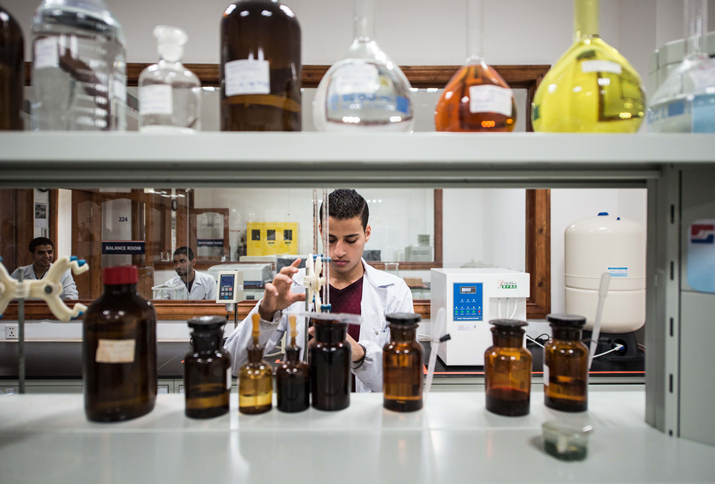|
|||||||||||
|
|
| Well-Placed Relationship |
| With its strategic location and abundant resources, Egypt's future development is entwined with China's |
| By He Wenping | VOL. 8 February 2016 |
 |
| A Chinese enterprise in the China-Egypt Suez Economic and Trade Cooperation Zone |
 |
Pioneering cooperation
Xi’s visit to Egypt shows that China attaches great importance to developing its relations with the Arab nation. In fact, China and Egypt have profound and extensive bilateral relations. The two countries established diplomatic relations on May 30, 1956, making Egypt the first African country as well as the first Arab country to do so with China. Since then, the bilateral relations have grown.
In 1999, Egypt established a strategic cooperation partnership with China, the first of its kind in the developing world, ushering in a new phase in bilateral relations. Under the frameworks of the China-Arab States Cooperation Forum and the Forum on China-Africa Cooperation (FOCAC), China and Egypt have launched cooperation in various fields in recent years.
In 2009, the Fourth FOCAC Ministerial Conference was held in Egypt’s coastal city of Sharm el Sheikh. Five years later, China and Egypt formed a comprehensive strategic partnership, setting an example for China-Africa and China-Arab states cooperation in the new era.
Egypt is an important country in the Arab, African and Islamic worlds and China has always attached great importance to the development of Sino-Egyptian relations. In early 2011, the "Arab Spring" changed the political situation in Egypt, and its economy and tourism industry plummeted due to the upheaval. Despite the turmoil, China adhered to its principle of not?interfering?in Cairo’s internal affairs and respecting Egyptians’ choices, and continued its economic cooperation.
That year, despite the turmoil, China-Egypt trade hit $8.8 billion, a year-on-year increase of 26.5 percent. China’s direct investment reached $82.8 million, up 60.4 percent year on year. All this reflects the sincere friendship between the two countries in times of adversity.
In September 2015, Egyptian President Abdul Fatah Al-Sisi attended the celebration of the 70th anniversary of the Victory of the Chinese People’s War of Resistance Against Japanese Aggression and the World Anti-Fascist War in Beijing. Eighty-one members of Egypt’s military took part in the guard of honor at Tiananmen Square, making Egypt the only African as well as Arab country to participate in the important military parade. This was a testament to the long and strong friendship between China and Egypt.
Following up on FOCAC pledges
President Xi’s visit to Egypt was also a trip to implement the outcomes of the FOCAC Johannesburg Summit held in December 2015 in South Africa. The first FOCAC summit held in Africa endorsed the Johannesburg Declaration and Johannesburg Summit Action Plan (2016-18), putting China-Africa?development?into the fast lane.
The most arresting part of the Johannesburg Summit outcomes is the "10 cooperation plans" between China and Africa supported by $60 billion in funding pledged by Beijing. The plans include a China-Africa industrialization plan, China-Africa agricultural modernization plan, China-Africa infrastructure plan, China-Africa financial plan and China-Africa green development plan. The 10 cooperation plans are designed according to the African Union’s Agenda 2063 to guide the development of Africa over the next 50 years.
Egypt can be one of the first African countries to implement the 10 cooperation plans as China and Egypt complement each other in many areas. An African country with a large population, Egypt boasts abundant human and tourism resources, as well as natural resources such as oil and gas.
Its proximity to the?Mediterranean Sea and?the Red Sea makes Egypt a gateway to Africa, the Middle East and Europe for Chinese enterprises. On?the other hand, China, as the world’s second largest economy, has sizable foreign exchange resources and a huge investment capacity and can help Egypt in its industrialization and modernization.
Most importantly, China has the economic development experience that can help developing countries escape poverty. Consolidating and developing strategic cooperation with Egypt can not only promote sustainable development in bilateral economic cooperation but also provide strategic support for China to strengthen its cooperation with Arab and North African countries. So Egypt needs China and vice versa.
Figures also talk. In 2014, Sino-Egyptian trade hit $11.6 billion, setting a new record. In the first nine months of 2015, the figure reached $9.67 billion, a year-on-year increase of 13 percent on the corresponding period of the previous year.
In terms of strengthening industrial capacity, China and Egypt complement each other and need each other. China accounts for one third of the world’s manufacturing industry and has surplus industrial capacity, which?is advanced compared to many developing countries.
In contrast, Egypt has insufficient foreign exchange reserves and underdeveloped infrastructure. It urgently needs to improve its manufacturing industry and industrialization level by enhancing its industrial capacity. To achieve this, it needs investments from China. When President?Sisi?visited China in 2015, the two countries signed a framework agreement for industrial capacity cooperation.
Belt and Road Initiative
With the domestic political situation increasingly stabilizing in the past two years, rejuvenating the economy has become one of the most urgent tasks facing the Egyptian Government. On his first visit to China in December 2014 after assuming office, President Sisi stressed that infrastructure development is Egypt’s top priority. It included widening the Suez Canal, constructing railways and roads, and upgrading ports. He also supported China’s Belt and Road Initiative (the Silk Road Economic Belt and the 21st-Century Maritime Silk Road). The Egyptian president participated in economic meets such as the China-Egypt New Silk Road Business Forum. This enabled him to have direct dialogue with Chinese entrepreneurs to court more Chinese investment in areas such as energy, agriculture, infrastructure and telecommunications.
The Egyptian Government’s Suez Canal Corridor development program aims to transform the area along the 190-km canal into a global economic zone linking Asia and Africa.
The China-Egypt Suez Economic and Trade Cooperation Zone exemplifies connecting the Great Wall and the pyramids. Located at the starting point of the Suez Canal Corridor, the zone boasts unique development advantages for promoting strategic cooperation between China and Egypt, including industrial capacity transfers from China, and raising Egypt’s economic development.
By the end of 2013, the zone had attracted 58 enterprises with cooperation investment of nearly $610 million, and provided more than 2,000 jobs for locals.
As the Hong Kong-based newspaper Ta Kung Pao wrote, China’s Belt and Road Initiative resonates closely with Egypt’s national development strategy. The Suez Canal occupies an important strategic position and since being sworn in, President Sisi?has been promoting the development of the Suez Canal Corridor. Besides, Egypt is an important country in the region. So, successful cooperation under the Belt and Road Initiative can set an example for other Arab and?African countries.
Considering all this, President Xi’s visit to Egypt will consolidate the historical links between the Great Wall and the pyramids.
(The author is a senior researcher of the Charhar Institute and the Institute of West Asian and African Studies, Chinese Academy of Social Sciences)
|
|||
| Copyright ChinAfrica All right reserved 京ICP备08005356号 |